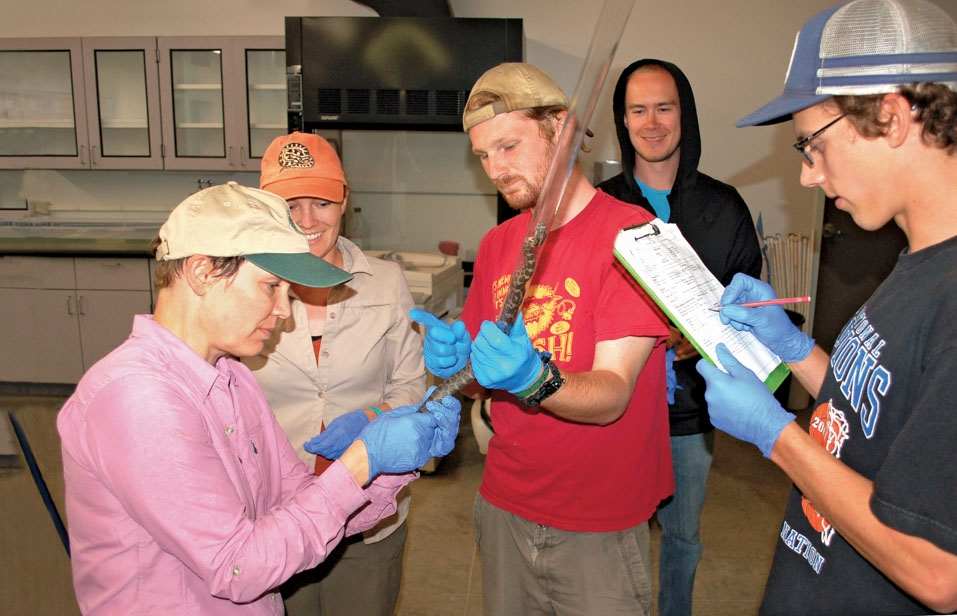Research Spring 2016
Rattlesnake refuge
by Matthew Makowski
There are almost 20 species of snakes that are native to Michigan, but the eastern massasauga rattlesnake is the only venomous native. Grand Valley researchers have been actively trying to keep this species, currently threatened by snake fungal disease, from slithering its way onto the U.S. endangered species list.
Snake fungal disease was first detected in Michigan massasaugas in 2013. Jennifer Moore, assistant professor of biology, said the eastern massasauga is threatened or endangered in every state where the species resides, except for Michigan where it is listed as a “species of special concern.”
Moore and a team of students have been conducting research for two years in an effort to keep the snake off the endangered list, but the species was proposed for federal listing by the U.S. Fish and Wildlife Service in September. Moore said the team anticipates the results of the proposal will be announced this fall.
“We currently don’t know what impact this disease will have on wild snake populations, but all rattlesnakes that have been brought into captivity for potential treatment have died, so the potential for serious declines exists,” Moore said.
Conducting research is only half the battle when it comes to saving eastern massasaugas. Public education about the species has been a central focus of the team’s efforts through media appearances and conference presentations.
“If the public has a better understanding of the importance of these snakes for healthy, functioning wetland ecosystems, people might be more inclined to support rattlesnake, wetland and species conservation, as well as environmental stewardship more generally,” Moore said.

Sandy Breitenbach, in front, and student researchers examine an eastern massasauga rattlesnake at Pierce Cedar Creek Institute. Breitenbach is a high school teacher who worked as a research fellow with Jennifer Moore.
Moore added that the general public can help in these preservation efforts by supporting policies, institutions and groups geared toward threatened and endangered wildlife conservation.
“The main reason these snakes are threatened is loss of their natural habitat,” Moore said. “Supporting groups that protect land, and the critical habitat that these species need will go a long way.”
Since the proposal in September, Moore’s team has been concentrating on long-term monitoring of a population near Hastings. Last summer, the team conducted fungal disease testing at four sites in Michigan, one of which was Bois Blanc Island, which Moore said is a haven for rattlesnakes.
In addition to field research, the team has monitored the species at Pierce Cedar Creek Institute in Barry County to assess its long-term viability. Danielle Bradke, a graduate student majoring in biology, said the institute is interested in collecting
data on this population so officials can make land management decisions that will help conserve these reptiles.
Along with studying population demography and how habitat management activities may affect the presence of the disease, Moore’s team is aiming to better understand the ecology of the fungus, Ophidiomyces, which causes snake fungal disease.
Bradke said along with the disease, eastern massasaugas have also suffered large population declines due to road mortality and persecution by people who are afraid of snakes or don’t like them.
“Like other animals, these snakes have an important role in the ecosystem,” Bradke said. “They help control rodent populations and act as food for other species. Additionally, protecting this species means protecting their wetland habitats, which is very valuable because they control flooding, help maintain good water quality, and provide suitable habitats for many other animals and plants.”
